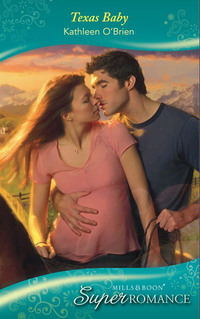Das Buch kann nicht als Datei heruntergeladen werden, kann aber in unserer App oder online auf der Website gelesen werden.
Buch lesen: "Texas Baby"
“We spent a month together,”
Josie continued. “I know all about him. I know he got his first horse when he was six. I know that when he was ten his collie died, and he carved the gravestone himself.”
The lawyer’s eyes widened slightly. “Anyone could know those things.”
“No,” a harsh voice came from the doorway. “Not anyone.”
The lawyer leaned forward. “Chase!”
Josie felt nauseated again. Who was this? Were they trying to fool her, bringing in someone to pose as Chase and hope she’d snap at the bait?
“It was Chase who told me.”
“That’s a lie. Until you wrecked your car in my driveway, I had never seen you before in my life.”
He sounded…so certain. So indignant. So exactly how an honest man unjustly accused would sound. Suddenly she understood. The dashing heartbreaker she’d met and the tenderhearted rancher’s son whose stories had won her heart…they were two different men.
“Damn it. Say something.”
She met his furious gaze helplessly. She had nothing to say. Not to him. All she could possibly say was…
“I’m so sorry, Mr Clayton. I’ve never seen you, either.”
ABOUT THE AUTHOR
If you could own any horse, it would be… (um, would someone else muck out the stalls?) If so, then Tornado, Zorro’s beautiful black Andalusian. John Wayne or Gary Cooper? Cooper, of course! “Don’t shove me, Harv. I’m tired of being shoved.” Favourite Western? Butch Cassidy and the Sundance Kid. Best name for a horse? Merrylegs, from Black Beauty. Cowboys are your weakness because… I love a man who can do, will do and doesn’t ever complain. What makes the cowboy? It’s the hat. Think James Dean in Giant. Oh, what a perfect tilt can do to a woman!
Dear Reader,
Having a baby is one of the most exciting things a woman can do – and one of the most terrifying. A new human being is taking shape inside you, a child who will own your heart and change your life. Yet you have no idea what this new person will be like. Sometimes we’re mature enough to think about the genetic implications of the man we pick to father our children. More often, I’d suspect, we’re just swept away, by love or lust, or the hope of relief from loneliness.
Josie Whitford was hungry for all those things. And now, too late, she discovers that she doesn’t know who the father of her child really is. But then she meets Chase Clayton, the handsome rancher who is everything her lover wasn’t. As they search for the man who abandoned her, she begins to have second thoughts about what makes a “father.” Is it possible that birth is only the beginning?
Yes, a father can give you curly hair and brown eyes. But he can also give you love and patience, wisdom and courage and, above all, time. Time spent telling bedtime stories, explaining photosynthesis, kissing away tears. His constancy can make you confident. His strength can make you brave. His compassion can make you kind. Chase Clayton could be that kind of father. But Josie’s already pregnant, and he’s engaged to someone else. Surely it’s too late for them.
Or is it? Is it possible that love really can conquer all?
I hope you enjoy their story.
Warmly,
Kathleen
Texas Baby
KATHLEEN O’BRIEN
MILLS & BOON
Before you start reading, why not sign up?
Thank you for downloading this Mills & Boon book. If you want to hear about exclusive discounts, special offers and competitions, sign up to our email newsletter today!
Or simply visit
Mills & Boon emails are completely free to receive and you can unsubscribe at any time via the link in any email we send you.
CHAPTER ONE
IT WAS ONE OF THOSE MORNINGS.
No, Josie Whitford corrected herself as she poured another round of coffee into Mr. Benetta’s cup, smiling even though she had a hammering headache, that was a laughable understatement.
It was one of those years. The ones in which you just couldn’t catch a break, couldn’t get ahead, couldn’t even run fast enough to stay in place. Ones where you felt yourself stumbling, slipping backward, as if life were a treadmill set on the highest speed, programmed to cycle out the weak.
Of course, the morning itself was lousy, too. Raindrops as fat as marbles, true Texas raindrops, bounced off the oily pavement, and the windows of the Not Guilty Café had turned gray and runny. They reminded Josie of the last plate she’d carried to the kitchen, prune juice splashed into the remnants of over-easy eggs. For a minute, just remembering, she thought she might get sick.
Oh, God, she wasn’t finally catching that flu, was she? She’d managed to avoid it all winter, but lately she’d been so run-down, so damn tired. The splat of gravy on her apron, courtesy of the kid at table two, sent up a wave of odor, and the banana she’d had for breakfast rose in her throat.
No. She clamped her jaw. Not on the customer. That would be the perfect excuse to fire her, the one Ed had been waiting for.
She pivoted away from Mr. Benetta, breathing through her mouth to avoid the smell of bacon grease wafting from the grill. The Not Guilty Café didn’t use the best cuts of anything, but it had the benefit of a great location. Tucked into the shadow of Riverfork City Hall and courthouse for the past fifty years, the café had become a tradition for the local politicians, businessmen and lawyers.
For a minute, she just stood there, the coffeepot hot against her hand, the banana roiling in her stomach. She looked around, panicked, but oddly paralyzed. On a day like this, when the rain made a good excuse for arriving late to work, the customers lingered, and the café was jammed. Where could she throw up without having to pay someone’s dry cleaning bill?
Nowhere. She felt sweat break out on her forehead even as a chill passed across her back, from shoulder to shoulder. She set down the coffeepot, which suddenly felt as heavy as an anchor.
Oh, how she wanted to go home. She longed for a nap, for the soothing warmth of the expensive sheets Chase had bought her that day in the Galleria. Sometimes, when she snuggled down into the five-hundred-thread cocoon, she could imagine that Chase, with his hot hands and his hard body, was still lying there beside her.
That she wasn’t completely alone.
But she was alone. And unless she intended to sell those sheets to pay next semester’s tuition, she’d better stay put, chills or no chills. She needed every penny she could make today. And then some.
“Hey, gal, come out of that trance. Is your blood sugar low? Table six is getting cranky. And you know Ed’s watching.”
Josie snapped to attention, anxiety taking precedence over nausea. She tossed Marlene, her favorite coworker, a grateful grimace, then glanced toward the front register, where Ed stood, giving her the evil eye.
The bastard. If she was exhausted, it was his fault. He’d been working her double shifts for weeks, seating all the most demanding customers in her section, riding her like a devil. No one could keep that pace, and he knew it. He would torment her as long as he could, for the sheer fun of it, and then he’d fire her.
“Don’t let him get to you, hon.” Marlene leaned in, her shoulder warm against Josie’s, her voice a raspy whisper. “You know he’s just cranky ’cause he can’t get into your pants.”
Josie nodded, though that wasn’t exactly true. Ed was angry, all right. But he wasn’t upset just because Josie always told him no. What made him positively rabid was that she’d told Chase Clayton yes.
Fat lot of good that had done her. At least if she’d slept with Ed she might have gotten a raise and some decent shifts. Sleeping with Chase Clayton hadn’t left her with anything but a bruised heart, a cynical attitude toward romantic dreams and a C on her English lit exam—her first C in four long years at the community college.
And, of course, a set of supersoft sheets.
Maybe her blood sugar was low. She felt tearful suddenly, just at the thought of Chase, which was really dumb. He’d been gone for two months now, twice as long as the fairy tale had lasted in the first place.
She dug in her pocket for a glucose tablet and popped it surreptitiously into her mouth. Ed saw, of course, though he probably thought it was gum, or an aspirin. Marlene was the only one who knew about her diabetes and the shots she’d taken every day since she was a kid.
Frowning, Ed called her name out in a booming voice. He always talked like a radio announcer, probably to compensate for being shaped like a stick of spaghetti. And maybe other shortcomings, as well. There must be a reason the waitresses secretly called him “pinkie.”
“Josie!” He made a circular “hurry up” motion with his hand. He pointed toward the waiting area, a ten-square-foot nook where some of the biggest deals in Riverfork politics were forged by big, red-faced men with soft drawls, Stetson hats and lizard-skin boots.
It wasn’t Josie’s turn to straighten the area, and, just as Marlene warned her, the dad at table six was tapping his menu and shooting her dirty looks, but she knew better than to argue with Ed.
Still, there might be trouble, and she didn’t have the energy to cope with it today. The dad looked like an Alpha male and would undoubtedly complain about her slow service. Ed obviously expected that—wanted it, even. He had a stack of write-ups on her now, and when he got tired of torturing her, he’d stuff them down her throat.
She should quit.
But even that took more energy than she had today.
As she gathered old, crumpled paper coffee cups, dirty stir sticks and torn straw wrappers, she felt Ed’s gaze crawl across her back like bugs.
She took shallow breaths, trying not to smell the old, spilled coffee. Though her hands shook, she moved aside the mints and the rumpled newspaper sections, which felt clammy, absorbing the stormy air. Putting those back together would take forever, but she might as well get started.
Ed was a fool to keep the customers waiting, just to play this power trip on her. Someday one of them would complain to the owners, and he’d learn that managers could lose their jobs, too.
That ought to please her, but somehow it didn’t. She couldn’t really feel anything but this pulsing nausea. She ought to start stumping for a new job. She ought to sue him for sexual harassment.
But the very idea of any of those things felt like climbing a jagged, frozen mountain. She couldn’t even summon up enough indignation to hate him right now.
What on earth was wrong with her? She wondered if her insulin dose might be out of whack after all. Surely this weary exhaustion wasn’t completely emotional. Surely it wasn’t all about Chase Clayton.
Coming home to find her fairy-tale lover vanished, her idyll smashed, had been painful, but not completely crushing. As beautiful as the fantasy had been, she’d always known it couldn’t last. A rich, handsome rancher with 25,000 acres romancing a twenty-five-year-old waitress struggling to make her rent and finish community college?
Yeah, right. Everyone knew how that story ended.
So, though it had hurt, she’d fully expected to nurse her bruised heart and childish disappointment for a while, then dust herself off and get back to work.
But instead of feeling a little stronger every week, she’d actually been sinking, going deeper each day into this shadowy hole of lethargy. Last night she’d been so depressed she had even picked up the phone and begun calling her mother’s house in Austin.
Luckily, she’d come to her senses before the last number was punched. Her hands had trembled as she put down the receiver, grateful for the near miss. Suppose her stepfather had answered? He’d warned her she couldn’t make it on her own. She’d spent the past seven years proving him wrong, by God, and she wasn’t going to give up now.
She picked up the sports section, the most pawed-over of the lot, naturally, and rearranged the pages. Then she added the front page, with its war news and bold black headlines predicting bird flu, rising murder rates and new taxes.
She closed her eyes, fighting back another wave of nausea.
It must be the flu. Maybe she’d better see the doctor next time Ed gave her a day off. If he ever did.
Finally she located the feature section, which had been folded inside out. The page on top was all weddings and engagements, row upon row of finger-sized pictures of beautiful young women who radiated confidence and optimism, as if they were lit by the shimmer of their engagement diamonds. As if they’d been sprinkled with the magic dust of True Love.
She squeezed the paper so hard it bent and softened in her damp fist. How lovely it would be to feel like that. Adored, pampered, beaming. Your whole life in front of you, and a loving partner to stand beside you, in sickness and in health.
To know that you would never be alone again.
“I’ve transferred table six to Marlene,” Ed said, his swollen voice suddenly right behind her shoulder. “They were ready to get up and leave. For God’s sake, I had no idea cleaning up over here would take you so long.”
Yes, you did, she wanted to cry out. But vomit closed off her throat, and a deep heaviness flowed into her veins, as if she’d been injected with mud. She didn’t even look at him. She kept her eyes on the happy women, the healthy, happy women standing on the threshold of paradise.
Aleshia Phillips to marry Timothy Braxton.
Sandra Culter to marry Arthur Brun.
Susannah Everly to marry Chase Clayton.
What?
Her heart stopped. She tried to take in air, but her throat wasn’t working, either.
Susannah Everly to marry Chase Clayton.
No.
Chase Clayton.
Josie felt her head bobbing, as if her heart beat so hard it shook her whole body with every stroke. She saw her own brown bangs, which needed cutting. They looked dull and lank as they trembled across her vision. She tried to think, but none of the gears in her brain seemed willing to turn.
She held out one hand toward Ed. “I,” she began, strangling the word. “I—”
He had no pity, as usual. He looked annoyed by her incoherence. He shifted, and his cologne filled the air. “Jeez, Josie, get a grip.”
And then, finally, she lost the battle, all the battles. With her pride, with her heart, her exhaustion, and even, to Ed’s dismay, her roiling stomach.
“I—” She tried one more time.
And then she threw up all over his lizard-skin boots.
CHAPTER TWO
TWO HOURS into his own engagement party, Chase Clayton was bored and restless and having trouble hiding it.
He had agreed to put on a tie and make nice with all their friends for Susannah’s sake—she loved parties—but the truth was, he was bored stiff.
Besides, there was work he needed to do. Well, needed might be an exaggeration. Trent, his ranch manager, was too good to leave much for Chase to worry about.
But there was work he’d rather do. Every time another person in this endless line of well-wishers came up, slapped him on the back and offered the same carbon copy congratulations, he smiled politely, but his mind was a mile away, wondering how things were going on the reroofing of the south stable.
When his phone vibrated on his belt, it was like getting a governor’s reprieve. He eased back his jacket and sneaked a peek at the text. Trent had a problem and needed a minute. Chase could say no, but he wasn’t going to. Fate had thrown him a life raft, and he was jumping on.
“Would you excuse me? That call was from Trent. Some kind of hay emergency, if you can believe there is such a thing.” Chase smiled at Jenny Wilcox, the pastor’s wife, who for some unknown reason seemed to be so damn happy about Chase’s engagement that she’d spent the past twenty minutes alternately giggling and then tearing up like a leaky faucet.
“Of course. I’ve kept you from Susannah far too long,” Jenny said, sniffing in a bliss of emotion. “Oh, I’m so pleased that you two finally got together! You’re so perfect together. And with the ranches right next door…oh, it’s just too perfect!”
Before another spill of tears could appear, Chase squeezed her hand and turned away. Trying not to attract attention, he set down his tumbler of ice water and eased toward the corner of the terrace. He wondered, just for a second, whether Trent had manufactured this crisis. He knew Chase well, and might have guessed that his boss needed a breather.
Or maybe it had something to do with Sue. Chase looked over his shoulder. Susannah Everly stood by the fountain talking to Jim Stilling, their lawyer. She held a glass of white wine that caught the sunshine when she drank, tossing it in gold sparkles onto her strong, tanned shoulders. Jim seemed mesmerized, and even Chase had to admit that Sue looked great. That low-cut green dress was the girliest outfit he’d ever seen her wear, and he’d known her all her life.
Any man in his right mind would be thrilled to marry a woman like that.
The man he was about to meet, for instance. Trent Maxwell had loved Susannah for years.
Which showed how Fate enjoyed a little kick of irony, didn’t it?
Chase slipped around the edge of the terrace. As the chatter of voices faded, he strolled to the front of the house, ignoring the small twinge of conscience at being absent from his own celebration.
All through his childhood, he’d been infamous for sneaking away from family parties. His parents had thrown the biggest balls and barbecues in the county. Anything was an excuse for a Clayton festival—Christmas, birthdays, Chase’s elementary school graduation, the full moon…anything. But Chase always found himself bored, drifting down to the riverbank to catch minnows, or into the stables to brush Captain Kirk, the lazy bald-face bay his parents had given him when he’d turned fourteen.
“You sure you’re a Clayton, son?” His father, a huge, happy man, loved to snag his young son by the feet. “You sure your mom didn’t slip the corral about nine months before you were born?” He’d check Chase’s heel, just for the pride of seeing the walnut-colored Clayton birthmark. “Yep, you’ve got the family brand, but I’ll be damned if I know where this antisocial stuff sneaked into the bloodline.”
It had sneaked in, though. Chase and Trent had been friends since elementary school, and Chase sometimes wondered whether they had been accidentally switched at birth. Trent was suave and well dressed, socially sought after, the ideal guest. Chase preferred blue jeans and hard work, and the company of horses.
“Hey, corporal, over here,” a voice said, and Chase looked toward the front porch. Trent stood in the shadows, leaning over the balcony, his shoulders oddly stiff. He hadn’t turned his head in Chase’s direction. Instead, he seemed half-frozen, staring out toward the road.
Chase wondered what Trent was looking at. The main house fronted pretty close to the street, so this view wasn’t the one that took your breath away.
The real beauty was from the back, where the party was going on right now. The Double C was substantial, but not grand—25,000 acres now that Chase had bought the Hillman land—and, behind the house, acre after acre of green pasture and ponderosa pines undulated down to the creek. Clayton land splashed right through the clear, pebbled water and then marched across another ten thousand acres of peach orchard, almost all the way to the Austin city limits.
Out here, though, there wasn’t much to see, unless you counted the bluebonnets on either side of the white fence that marked the half-mile driveway. But as Chase drew closer, he got a better view of Trent’s face. He realized his friend hadn’t been looking at anything. He’d just been staring blind.
Of course. This wasn’t going to be an easy day for Trent, no matter how you cut it.
Chase climbed the six steps and joined his manager on the porch, leaning his elbows on the banister, too. “So, what’s up? Is there really a hay emergency, or are you playing guardian angel, giving me a breather?”
Trent laughed. “Both. About the hay—we went with that new company you said you wanted. Old Joe’s daughter’s new business. She delivered a semi load today, and the first three bales were moldy.”
Trent’s educated voice was clipped, clearly irritated. He didn’t tolerate moldy hay, or any other kind of shabby work, which was what made him the perfect ranch manager. He was what cowboys used to call “square.” Completely on top of his job.
“Damn it.” Chase whistled through his teeth and scuffed a toe against the balustrade. “I really wanted to throw her some business. Joe asked me to, and you know he wouldn’t ask a river for water if he were dying of thirst.”
“That’s why I called. Ordinarily, I’d just send it back and get another hay company. We don’t give second chances. But since she’s old Joe’s daughter…”
“Yeah.” Hell’s bells. Chase knew he was without options here. Joe had been ranch manager for two generations of Claytons, and he’d reluctantly retired when Chase’s dad had died five years ago. But the old guy had dropped enough of his sweat on Clayton soil that Chase would always feel beholden. “Okay. Just this one time. She gets a do-over.”
Trent glanced at him, his mouth a one-cornered smile. “Somehow that’s what I thought you’d say.”
Chase smiled, too. Trent wasn’t kidding anybody. This little decision definitely hadn’t required a face-to-face. He’d just been saving Chase’s ass, and Chase appreciated it. Their business was done, but he didn’t move. He didn’t want to go back.
For a couple of minutes, they stood together in silence, watching the leaves of the sweet gum tree carve shapes on the front yard. In some intangible way, the silence wasn’t as companionable as it used to be, before Chase’s engagement.
He wondered if Trent was ready to talk about it. For the past month, they’d both pretty much pretended it wasn’t happening.
Finally, without taking his gaze from the grass, Trent spoke. “So. How’s it going back there? I saw her. She looks happy.”
Chase made a noncommittal sound. This was tricky territory they were stepping over, and he wasn’t sure of his footing. “I guess she is. That ranch means a lot to her. If it meant she could keep it, she probably would have married the devil himself.”
Shit. Two seconds into this conversation, and Chase already had a mouthful of foot. “Hell, Trent. You know what I mean.”
“Yeah. She would have married anyone.” Trent straightened up and met Chase’s gaze. He shrugged in that elegant way that drove most women mad. “Anyone but me.”
It was so true, there was no way to contradict it. So Chase didn’t try. Every word he thought of had a “quicksand” warning sign posted all over it. Better, when you didn’t have the gift of gab, to shut the hell up.
He considered laying his hand on Trent’s shoulder, but that seemed patronizing, too.
Apparently Trent agreed. He took a deep breath, then began descending the porch stairs. He paused at the bottom. “You heading back now? You probably should, you know. If your mom was here, she would’ve had a fit if she saw you leave your own party.”
Trent was right there, too. Chase’s mother had come from Virginia, and she’d had very strict ideas about how her son should behave. She didn’t mind his quiet nature, but whenever he was rude she’d always “explained” his mistake to him so gently and sweetly he ended up wanting to shoot himself.
“In a minute,” Chase said. “I need a little time alone. Jenny Wilcox was talking my ear off.”
Finally Trent smiled. “Your mom always said trying to teach a Texan manners was like trying to teach a snake to tap-dance.”
“Yeah. But she never had to talk to Jenny Wilcox.”
Trent chuckled, but still hesitated.
“Look, Trent,” Chase said, feeling oddly defensive. “I don’t plan to saddle up and ride off into the sunset. I’m not going to back out on her. I just want a few minutes alone.”
“Okay,” Trent said. “Just don’t…” He frowned. “Don’t stay out here so long it ends up embarrassing her.”
Chase nodded. “Never,” he said solemnly. He held Trent’s gaze. “That’s a promise.”
After Trent was gone, the minutes stretched out quietly, interrupted only by the carrying-on of the robins and the wind flirting with the sweet gum tree. Chase let his tired gaze rest on the bluebonnets, which were blooming their hearts out today.
They should have held the party out here. Susannah had the terrace decorated like something out of a magazine, lots of cute ribbons and potted plants shaped like illustrations from geometry textbooks. But for his money you couldn’t beat the first big honest splash of spring flowers.
He felt his chest relaxing. His breath came deeper, from the gut, where it was supposed to. After a few more minutes, he was a little sun-stunned, and when he heard a strange noise in the distance he wasn’t completely sure he wasn’t dreaming.
But then he transferred his gaze to the road and identified a foreign spot on the horizon. A car. Almost half a mile away, where the straight, tree-lined drive met the public road. He could tell it was coming too fast, but judging the speed of a vehicle moving straight toward you was tricky.
It wasn’t until it was about two hundred yards away that he realized the driver must be drunk…or crazy. Or both.
The guy was going maybe sixty. On a private drive, where kids or horses or tractors or stupid chickens might come darting out any minute, that was criminal. Chase straightened from his comfortable slouch and waved his hands.
“Slow down, you fool,” he called. He took the porch steps quickly and began walking fast down the driveway.
The car veered, from one side to the other, then up onto the slight rise of the thick green spring grass. It barely missed the fence.
“Slow down, damn it!”
He couldn’t see the driver, but he definitely didn’t recognize the automobile. It was small and old and hadn’t cost much even when it was new. It used to be white, but now it needed either a wash or a new paint job or both.
“Goddamn it, what’s wrong with you?”
At the last minute, he had to jump away, because the idiot behind the wheel clearly wasn’t going to turn to avoid a collision. He couldn’t believe it. The car kept coming, finally slowing a little, but it was too late.
Still going about thirty miles an hour, it slammed into the large, white-brick pillar that marked the front boundaries of the house. The pillar wasn’t going to give an inch, so that car had to. The front end folded up like a paper fan.
It seemed to take forever for the car to settle, as if the trauma happened in slow motion, reverberating from the front to the back of the car in ripples of destruction. The front windshield seemed to ice over with lethal bits of glassy frost. Then the side windows exploded.
The front driver’s door wrenched open, as if the car wanted to expel its contents. Metal buckled hideously. Small pieces like hubcaps skipped and ricocheted insanely across the oyster-shell driveway.
Finally, everything was still. Into the silence, a plume of steam shot up like a geyser, smelling of rust and heat. Its snakelike hiss almost smothered the low, agonized moan of the driver.
Chase’s anger had disappeared. He didn’t feel anything but a dull sense of disbelief. Things like this didn’t happen in real life. Not in his life. Maybe the sun had actually put him to sleep.
But he was already kneeling beside the car. The driver was a woman. There was no air bag. The frosty glass of the windshield was dotted with small flecks of blood. She must have hit it with her head, because just below her hairline a red liquid was seeping out. He touched it. He tried to wipe it away before it reached her eyebrow, though of course that made no sense at all. Her eyes were shut.
Was she conscious? Did he dare move her? Her dress was covered in glass, and the metal of the car was sticking out dangerously in all the wrong places.
Then he remembered, with an intense relief, that every good medical man in the county was here, just behind the house, drinking his champagne. He found his phone and paged Trent.
The woman moaned again.
Alive, then. Thank God for that.
He saw Trent coming toward him, starting out at a lope, but switching to a full run when he saw the car.
“Get Dr. Marchant,” Chase called. “Don’t bother with 911.”
Trent didn’t take long to assess the situation. A fraction of a second, and he began pulling out his cell phone and running toward the house.
The yelling seemed to have roused the woman. She opened her eyes. They were blue, and clouded with pain and confusion.
“Chase,” she said.
His breath stalled. His head pulled back. “What?”
Her only answer was another moan, and he wondered if he had imagined the word. He reached around her and put his arm behind her shoulders. She was tiny. Probably petite by nature, but surely way too thin. He could feel her shoulder blades pushing against her skin, as fragile as the wishbone in a turkey.
She seemed to have passed out, so he put his other arm under her knees and lifted her from the car. He tried to avoid the jagged metal, but her skirt caught on a piece and the tearing sound seemed to wake her again.
“No,” she said. “Please.”
“I’m just trying to help,” he said. “It’s going to be all right.”
She seemed profoundly distressed. She wriggled in his arms, and she was so weak, like a broken bird. It made him feel too big and brutish. And intrusive. As if touching her this way, his bare hands against the warm skin behind her knees, were somehow a transgression.
He wished he could be more delicate. But he smelled gasoline, and he knew it wasn’t safe to leave her.
Die kostenlose Leseprobe ist beendet.








